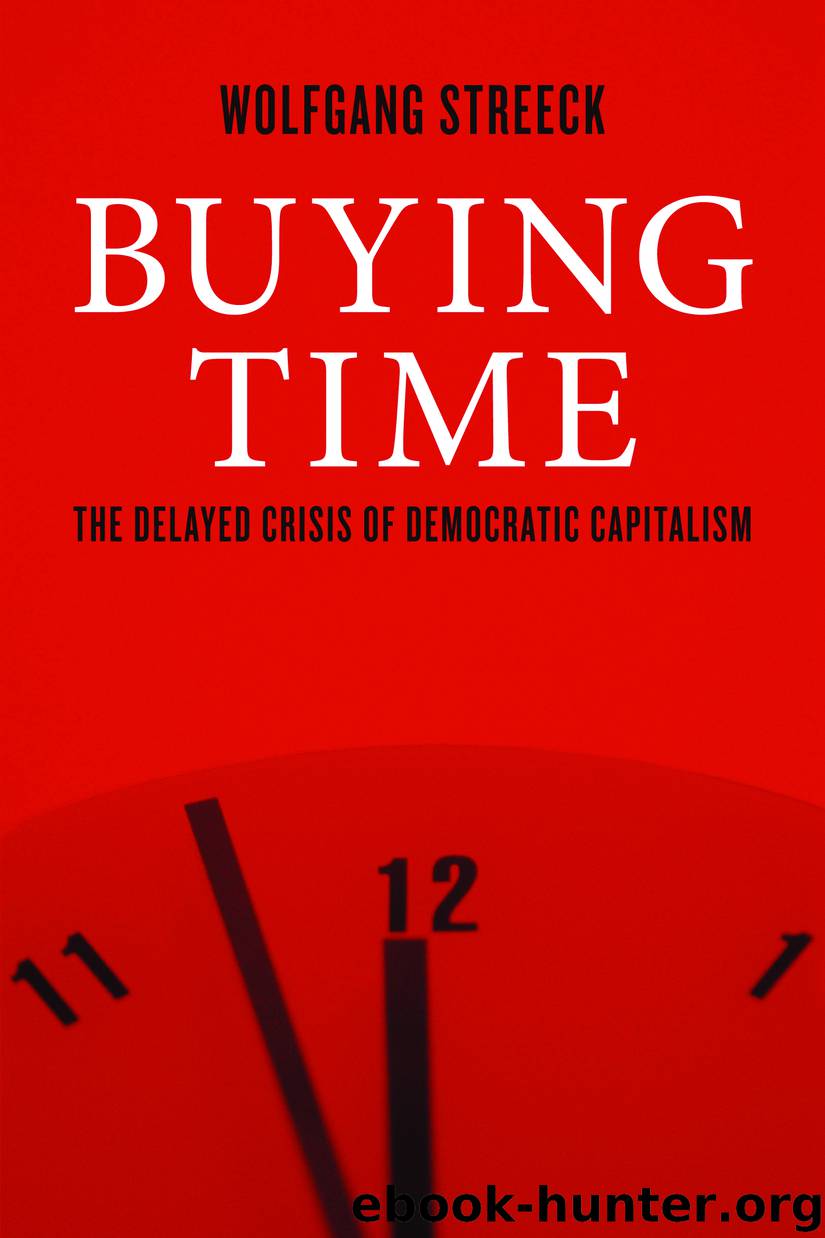Buying Time by Wolfgang Streeck

Author:Wolfgang Streeck [Streeck, Wolfgang]
Language: eng
Format: epub
ISBN: 978-1-78168-619-5
Publisher: Verso Books
Published: 2014-06-02T16:00:00+00:00
Hayek’s article from 1939 reads like a blueprint for today’s European Union – and not only in its rhetorical use of the theme of peace. It is true that the politics of integration of the postwar period initially conceived of European unification as the building of a transnational mixed economy,17 and at the time Hayek’s arguments for the unavoidable (and in his view welcome) liberalism of a supranationally integrated political economy probably seemed absurd to most.18 With time, however, European integration grew out of its Keynesian illusions and its enthusiasm for planning, and the more integration progressed and advanced into the centre of the European political economy, the more it followed Hayek’s intuitions of 1939: on the necessity within a federation to neutralize the effect of democratic institutions on the economy and to leave allocation decisions to free markets; on the need for a ban on market-distorting state intervention in the member-states, including the abolition of national currencies; and on the political obstacles which (in Hayek’s view, fortunately) stand in the way of federal integration beyond the creation and liberalization of markets.
In fact, after the Second World War, the European interstate quasi-federation that initially came about to preserve the peace proved in the long term – by virtue of its inherent political and economic logic anticipated by Hayek – to be a reliable and ever more powerful engine for the liberal transformation of Europe’s national economies and the curbing of national democratic projects to make social justice prevail against market justice. It was as if Hayek’s article had worked out the lines of force along which the institutions of European unity, originally designed for something quite different, would eventually position themselves. This became especially clear once the neoliberal turn began in the early 1980s, and clearer still in the continuing process of the institutionalization of what I refer to as the consolidation state. Today, and more than ever since the democratic – capitalist distribution conflict shifted to the level of international financial diplomacy, the ‘market forces’ whose aim it is to free the capitalist accumulation process from political correctives support themselves on the institutional dynamic foreseen by Hayek in 1939. The conversion of the European Union into a vehicle for the liberalization of European capitalism did not suddenly begin in 2008; it is the essence and result of a continual metamorphosis that is the European variant of the global liberalization process under way since the 1980s. This dual process – the now rapidly advancing liberation of the economy from democracy and the separation of democracy from the governance of the economy, intended to enshrine the institutional hegemony of market justice over social justice – might be described as the Hayekization of European capitalism, in memory of its long-forgotten, but then all the more successfully revived, theoretical promoter.19
Download
This site does not store any files on its server. We only index and link to content provided by other sites. Please contact the content providers to delete copyright contents if any and email us, we'll remove relevant links or contents immediately.
50 Economics Classics by Tom Butler-Bowdon(2571)
Six Billion Shoppers by Porter Erisman(2302)
Why Nations Fail: The Origins of Power, Prosperity, and Poverty by Daron Acemoglu & James Robinson(2297)
No Time to Say Goodbye(2117)
Red Notice by Bill Browder(2082)
Currency Trading For Dummies by Brian Dolan(1929)
The Economist [T6, 22 Thg9 2017] by The Economist(1927)
Thank You for Being Late by Thomas L. Friedman(1771)
Bitcoin: The Ultimate Guide to the World of Bitcoin, Bitcoin Mining, Bitcoin Investing, Blockchain Technology, Cryptocurrency (2nd Edition) by Ikuya Takashima(1699)
Amazon FBA: Amazon FBA Blackbook: Everything You Need To Know to Start Your Amazon Business Empire (Amazon Empire, FBA Mastery) by John Fisher(1575)
Coffee: From Bean to Barista by Robert W. Thurston(1546)
The Future Is Asian by Parag Khanna(1484)
The Great Economists by Linda Yueh(1454)
How Money Got Free: Bitcoin and the Fight for the Future of Finance by Brian Patrick Eha(1425)
Grave New World by Stephen D. King(1421)
Pocket World in Figures 2018 by The Economist(1419)
Capitalism Without Capital: The Rise of the Intangible Economy by Jonathan Haskel(1401)
The Sex Business by Economist(1386)
Cultural Intelligence by David C. Thomas(1289)
